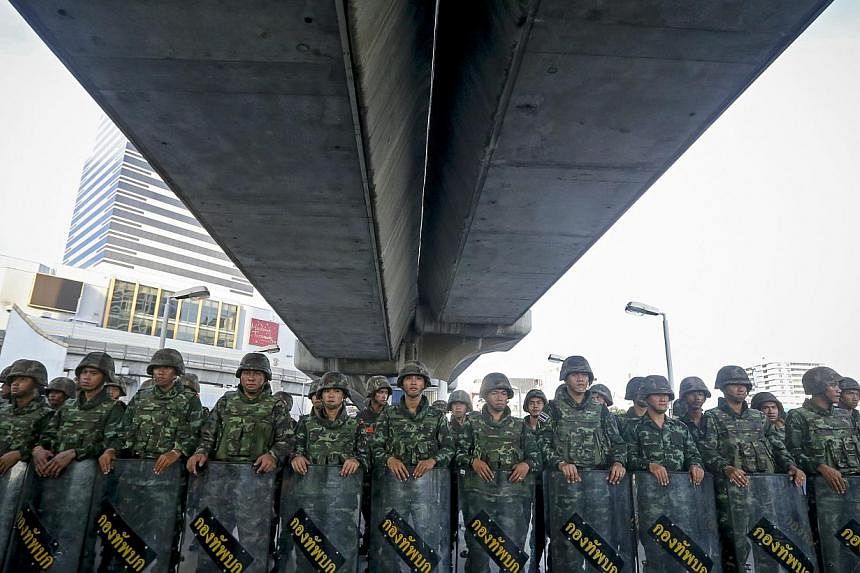WASHINGTON (AFP) - In swiftly punishing Thailand's military for seizing power, the United States is looking beyond short-term interests as it braces for prolonged strife in its oldest Asian ally.
Within hours after the army took control of Thailand on Thursday, Secretary of State John Kerry condemned the coup as having "no justification" and urged the quick restoration of democracy and press freedom.
The United States suspended US$3.5 million (S$4.4 million) in defence assistance, or about a third of its total aid to Thailand, and cancelled ongoing military exercises with the kingdom - a vital US ally for decades, including in the Vietnam War.
Washington also scrapped planned visits by senior officials, as well as a US government-sponsored firearms training programme for the Royal Thai Police that had been scheduled to start on Monday.
The United States had repeatedly warned the Thai military to stay on the sidelines. But some experts say the army considers the domestic stakes too high to be constrained by international opinion.
Thailand's two main political forces are widely seen as battling for influence to determine the shape of the kingdom following the reign of King Bhumibol Adulyadej, the world's longest-serving monarch, who is widely revered but is 86 and has suffered ill health.
"I don't think we have a lot of leverage, to be honest. Their political crisis is a once-in-a-century confrontation on who is going to be able to say what the order of power will be in the new Thailand after the succession," said Ernie Bower, the Southeast Asia chair at the Center for Strategic and International Studies.
"But in the long run, I think that the Thai people will remember what our position was and what we stand for, even if we weren't able to move the dial very much."
CHARTING DIFFERENT COURSE THAN CHINA
Analysts warned of an immediate risk for Washington as the Thai military could further embrace China.
President Barack Obama has put a top priority on "pivoting" US power to Asia, building alliances amid concern in several nations over China's rise.
Thailand, which historically has sought alliances with pre-eminent powers, has better relations with China than do many of its neighbours. China has not criticised the army takeover and was the first to recognise the last coup in 2006, leading to closer defence cooperation.
The United States suffered lasting damage to its reputation for supporting authoritarian regimes during the Cold War in a number of countries, including Argentina, Chile, Greece, Iran and several Central American nations.
But Washington has hardly shifted consistently in the opposite direction.
US officials last year went through linguistic acrobatics to avoid calling the Egyptian military's takeover a coup, a designation that under domestic law requires aid suspension.
Mr Kerry went so far last year as to say that the Egyptian army was "restoring democracy" by ousting elected president Mohamed Morsi, an Islamist whose performance in office had faced criticism.
US officials declined to compare decisions on Egypt and Thailand, saying only that Washington considered the two situations to be separate.
In Thailand, General Prayut Chan O-Cha openly declared a coup, which "didn't really leave a lot of wiggle room, but it does seem that Mr Kerry's statement was pretty harsh," said Joshua Kurlantzick, a senior fellow at the Council on Foreign Relations.
A HARSHER COUP
The quick US reaction comes amid predictions that the coup will be harsher than in 2006, when the army tossed out populist tycoon Thaksin Shinawatra as premier but his sister Yingluck Shinawatra swept to power democratically five years later.
"What the military learned in 2006 was, from their view, that they did not prescribe the right medicine. It was not strong enough to guarantee later outcomes," said Thongchai Winichakul, a history professor at the University of Wisconsin-Madison who was a Thai student leader in the 1970s.
Mr Thongchai said that international pressure could be more effective if coup supporters saw effects in Thailand beyond just cuts in military ties.
The coup "hurts their reputation, but the conservative royalist establishment is hoping that soon the international community will forget what happened," he said.

